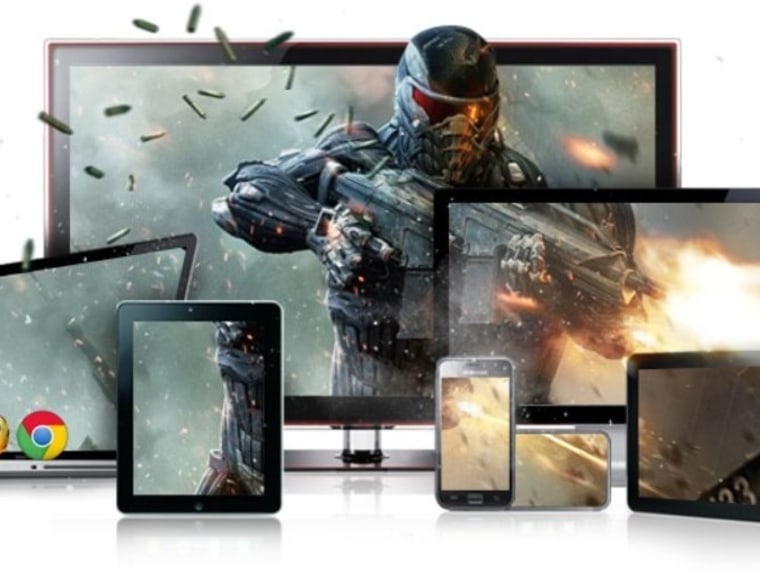As video game enthusiasts await the launch of the next generation of game consoles, one of the three big gaming powerhouses has made an interesting move -- one that could change the way we play video games in our homes.
Sony Computer Entertainment announced Monday that it has just purchased Gaikai -- a cloud gaming company that uses the Internet to stream video games from distant servers directly to your home computer, digital TV and even your tablet and phone.
Sony bought Gaikai for $380 million and the maker of the PlayStation game machine apparently has big plans for its shiny new property.
“SCE will deliver a world-class cloud-streaming service that allows users to instantly enjoy a broad array of content ranging from immersive core games with rich graphics to casual content anytime, anywhere on a variety of internet-connected devices,” Andrew House, president of Sony Computer Entertainment, said in a press release.
What makes Gaikai and its cloud gaming competitor -- OnLive -- so interesting is that these companies offer a service that lets you play the kind of high-end games you typically play on a home console (like, say, your PlayStation 3) on almost any web-connected device. With Gaikai tackling the heavy game processing loads on its own servers, you're free to play "Mass Effect 3" via Facebook and "Alan Wake" in Chrome, Firefox or Explorer. You don't have to download the games, own a game console or have a high-end gaming PC. You simply stream them -- like you would, say, a movie through Netflix.
So what does this mean for those game boxes we've become so used to playing our games with -- the Xbox, the PlayStation, the Wii? And what does it mean now that new machines are reportedly in the works? Is this the beginning of the end of console gaming?
Nintendo will launch its new console -- the Wii U -- this holiday. Meanwhile, though both Sony and Microsoft have not yet revealed details about their next game consoles -- the successors to the PlayStation 3 and the Xbox 360 -- there is no doubt both companies are working on them. In fact, many analysts expect these next-gen machines to launch next year.
But Michael Pachter, a game analyst for WedBush Morgan, doesn't believe consoles are going to be made obsolete by cloud gaming services such as Gaikai ... at least not any time soon.
He told me he expects Sony to integrate Gaikai into smart TVs, the PlayStation Network as well as the next generation of PlayStation machines.
"I think initially, they'll offer a lot of catalog (PlayStation 1 and 2 games), and maybe allow people to play more casual games through smart TVs, but ultimately, they will require a PlayStation 4 in order to access content in the cloud," he said.
In fact, he said he thinks Sony is taking Gaikai out "as a strategic move, keeping them from the hands of somebody who would let you play games without a console."
Jesse Divnich, game analyst for Electronic Entertainment Design and Research, agrees that consoles aren't going away in lieu of cloud delivery ... at least not right away.
"Right now there are some bandwidth issues," he told me in an interview. "Not everyone has the high Internet speeds to make cloud entertainment work."
Indeed, when I fire up "Mass Effect 3" in my browser via Gaikai, the game looks choppy if not downright ugly thanks to wavering Internet speeds here at my house. Just because you can play a high-end, triple-A game in your browser, doesn't mean you'll want to.
But that is today. As broadband spreads and picks up speed with each passing year, tomorrow will look very different. "No one will disagree that cloud technology is the future of delivery," Divnich told me, calling Sony's purchase of Gaikai "a genius decision to future proof their company."
"This actually goes well beyond video games," he said. "This is a technology that can be used to deliver all forms of digital entertainment."
As for the next generation of game consoles, Divnich said that he believes they will use some form of cloud delivery. But after that ... we will eventually say goodbye to our home game boxes.
"It does tend to take a while for consumers to transition technologies," he said. "But 10 years from now, the idea of having a set top box to play games -- that is probably going to go away and all of that is probably going to be handled through the television."
And as Divnich points out, "One of the best and biggest manufacturers of televisions is Sony."
Winda Benedetti writes about video games for msnbc.com. You can follow her tweets about games and other things on Twitter here @WindaBenedetti and you follow her on Google+. Meanwhile, be sure to check out the IN-GAME FACEBOOK PAGE to discuss the day's gaming news and reviews.
